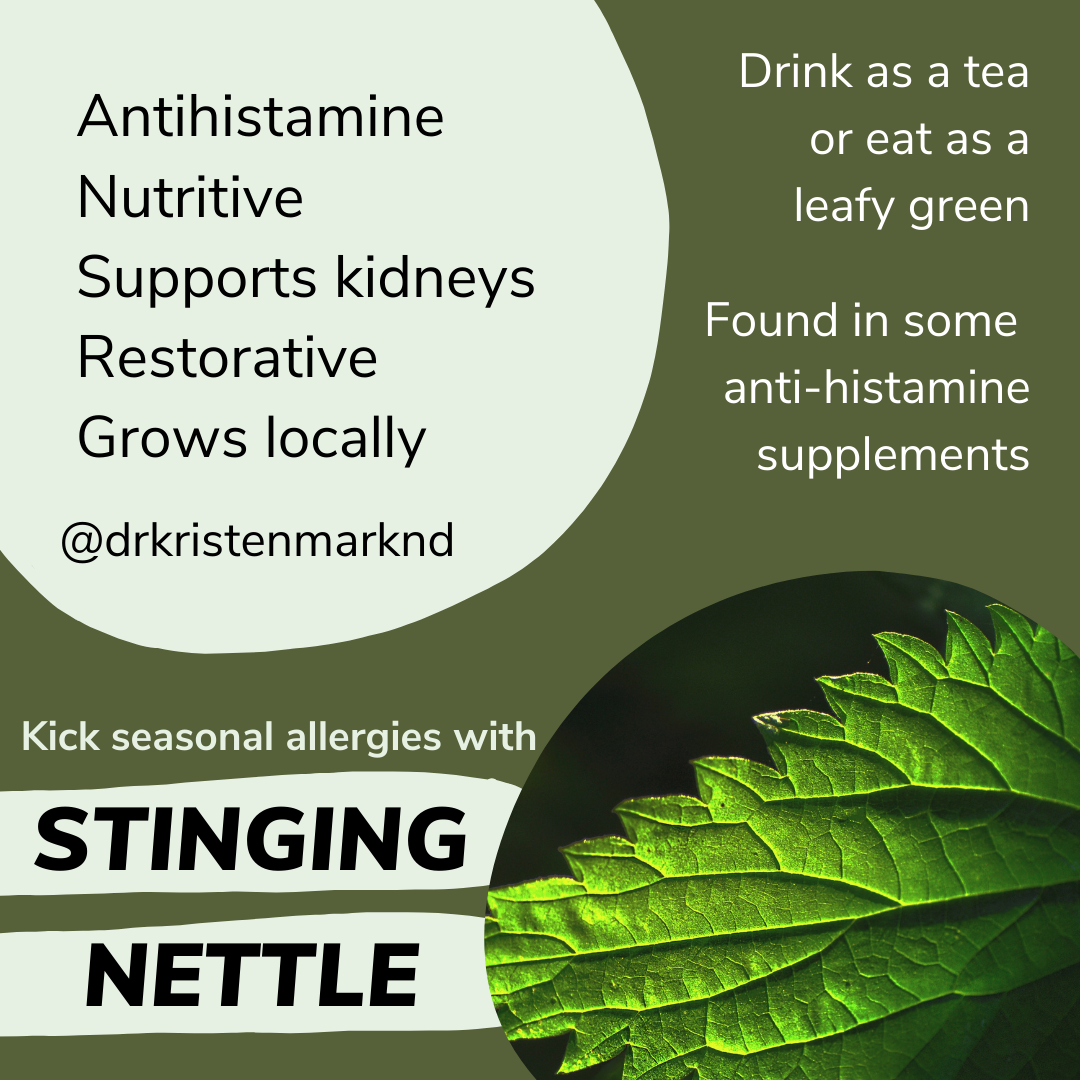Seasonal allergies are the result of our immune system overreacting to something in our environment. Our system perceives pollen, for example, as a threat and mounts an inflammatory response to get it the heck out of our body. The result can be itchy eyes, runny nose, scratchy throat and a general state of misery. It is commonly believed that our bodies are inclined and or trained to have this reaction at a young age, and once we’re ‘allergic’, there isn’t much we can do about it. While we may not be able to totally retrain our immune system, there’s some promising research on the horizon that suggests we may be able to reduce our body’s sensitivity to certain allergens. Find out more about allergy immunotherapy here, and the mechanisms of action here.
Until we figure out how to change our programming, there’s plenty of other options to help reduce the frequency and severity of seasonal allergies. The key to success is starting early, so if you know that you get sneezy at a certain time of year, it’s best to start taking action several weeks before that time.
Vitamin C for seasonal allergies
Vitamin C is important in a ton of cellular functions, and is happily found in many fruits and vegetables. When we’re prone to seasonal allergies, our need for vitamin C goes up. And since our body can’t make its own vitamin C, we have to get it from food or a supplement. Increasing your intake can help reduce histamine (responsible for most of the nasty allergy symptoms you know and hate) and thus reduce your allergy symptoms.
Taking a vitamin C supplement is the best way to ensure you’re getting a high enough dose to fend off the excess histamine that allergies can bring, but I recommend getting plenty of colourful fruits and veggies too! The main side effect that can occur with too much vitamin C is loose stools – so if that happens, just take a bit less (that’s called dosing to bowel tolerance).
Another note on vitamin C, chewable tablets may be pleasant and easy, but I don’t recommend taking these often or long-term as they can wear away the enamel of your teeth. If you do have some, go ahead and use them up, just rinse your mouth with water after you take them. And buy capsules or tablets next time.
Probiotics for immune balance
The microbiome (the microbial ecology of our body) has a huge impact on our immune function. Since seasonal allergies are an immune reaction to the environment, and our microbiome plays a role in moderating our immune response, you may notice an improvement in allergy symptoms when you supplement with probiotics. There are countless probiotic products and diverse microorganisms to choose from, and they can play a different role in the body depending on which combination you choose. Talk to your Naturopathic Doctor to figure out which probiotic product(s) may be best support your needs.
It’s amazing what an impact microbes can have on our health – gut health, reproductive health, mental health…the list goes on. Look for more articles on the many charms of microbes in later posts.
Quercetin for flavour?
Quercetin isn’t a vitamin or a mineral, it’s a flavinoid. Although flavinoids aren’t categorized as ‘essential’, we know that bodies do better with them than without. Quercetin has been shown to have antioxidant and antihistamine activity in the body. You can find it in fruits & veggies like onions, apples, grapes & berries. But it’s only found in small amounts in food. So, to get enough to impact your allergy symptoms, taking quercetin in supplement form is recommended.
Stinging Nettle for the win
Stinging nettle is one of the best botanicals for combatting allergy symptoms. It’s a potent anti-histamine so drinking lots of nettle tea, eating it with your food or taking it in supplement form can help kick your allergy symptoms to the curb.
I always like to highlight medicines that grow locally – and this one can be found everywhere! Now that spring is here, you’ll be seeing stinging nettle popping up all over the place. For more about this wonderfully nourishing herb, see our previous post all about stinging nettle.
Food for thought: dietary histamines
There are foods that can increase your histamine, so avoiding or minimizing these during allergy season may prove helpful. The biggest culprits are alcohol, fermented foods, vinegar, tomatoes, eggplant, spinach, ketchup, cured meats, bananas, beans, papaya, citrus, and nuts. Some foods can actually help decrease histamine, like fresh meat or fish, eggs, non-citrus fruit, gluten-free grains, most fresh vegetables, and oils. You may not want to radically change your diet for the sake of avoiding a runny nose, but with these foods in mind you may be able to make some seasonal adjustments to improve your symptoms.
There are of course other approaches, foods and supplements that may help, and the dosing or product that’s right for you may vary. It’s always recommended to work with a qualified healthcare practitioner when figuring out therapeutic dosing for supplements. Want to know more? Reach out to Dr Kristen Mark ND here!
Until next time, happy Spring!






